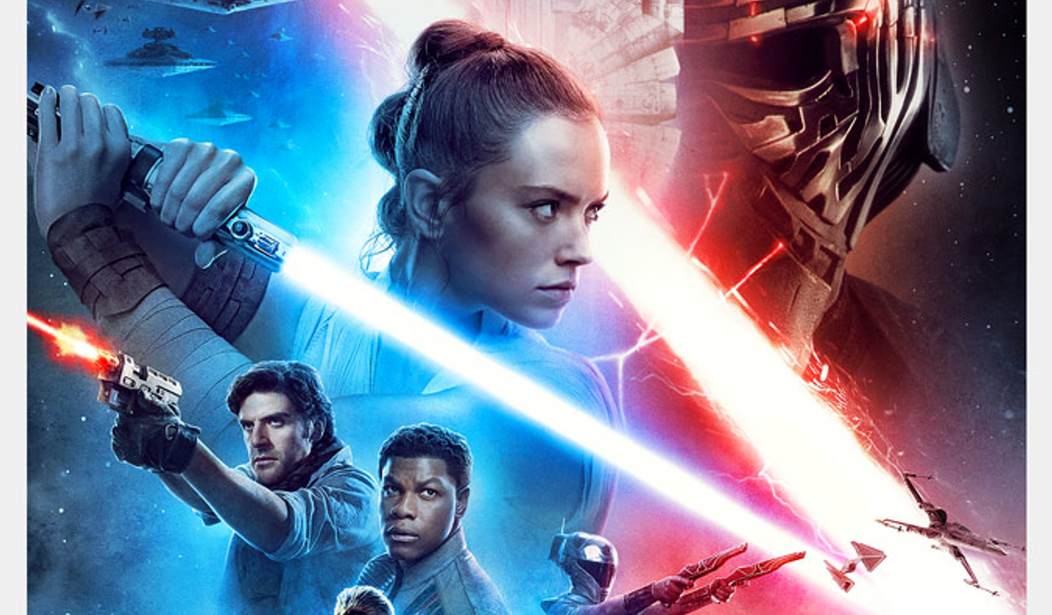Star Wars fans have long been disappointed with the new blockbuster trilogy. The Force Awakens (2015) ripped off Star Wars: A New Hope (1977) with a shallow too-perfect heroine, while The Last Jedi (2017) cynically destroyed Luke Skywalker’s character. But on Wednesday, visionary director J.J. Abrams hinted that the last movie in the trilogy, The Rise of Skywalker, may include LGBT themes — exciting some fans but more likely alienating even more of the Star Wars audience.
Some fans had suggested that Poe Dameron (Oscar Isaac) and Finn (John Boyega) should become a gay couple, but Abrams shot down that idea in an interview with Variety on Tuesday. He did suggest a different kind of LGBT heme in the movie, however.
“That relationship to me is a far deeper one than a romantic one,” Abrams said. “It is a deep bond that these two have, not just because of the trial by fire in which they met, but also because of their willingness to be as intimate as they are, as afraid as they, as unsure as they are, and still be bold, and still be daring and brave.”
Abrams made the right call in dismissing this idea. Sadly, the notion of platonic close companionship between two people of the same sex appears under suspicion, thanks in part to the LGBT movement. LGBT activists have strained to reinterpret close friendships in history — such as the one between King David and Jonathan in the Bible — using a sexual lens. Brothers in arms do not have to be somehow romantically involved, and the rush to make every relationship sexual cheapens our understanding of the rich tapestry of human interaction.
Yet Abrams did not just shoot down the idea of a Finn-Poe romance. He also told Variety that he has strived to find a Star Wars cast that “looked more the way the world looks than not.”
“And in the case of the LGBTQ community, it was important to me that people who go to see this movie feel that they’re being represented in the film,” the director said. Variety asked if there would be a “queer” character in The Rise of Skywalker.
“I will say I’m giving away nothing about what happens in the movie,” Abrams replied with a smile. “But I did just say what I just said.”
What exactly did the director say? He intends to include characters, themes, or a scene enabling “the LGBTQ community” to “feel that they’re being represented in the film.”
This kind of statement should worry Star Wars fans, whether they agree with the LGBT movement or not. Star Wars is not about making a world that “represents” the audience seeing the movie — it’s about telling an entertaining, fascinating, and compelling science fiction story that grows out of and builds upon the previous movies in the franchise.
Sadly, this push for “representation” may be partially responsible for the storytelling blunders of the new trilogy. Disney wanted a female heroine to be the main character — and that could clearly work, given the outsize role of Princess Leia (Carrie Fisher) in the original trilogy. Yet they made Rey (Daisy Ridley) inexplicably powerful, seemingly without flaws, and well-liked by all the main characters. Star Wars can have a female lead, but it shouldn’t have a “Mary Sue.”
Similarly, Disney introduced a new character — Rose Tico (Kelly Marie Tran) — who “represents” the nerdy Star Wars fan. She is female and Asian, and she preaches social justice themes — a home run for social justice warriors! But Tico does not feel right, and she actually ruins what would have been a beautiful sacrifice from Finn.
Of course, not all “representation” has flopped. Finn — the black reformed Stormtrooper — proved a fascinating and fitting addition to the cast of Star Wars characters. Sadly, his character is wasted on a wild goose chase in The Last Jedi.
Ironically, Abrams’ decision to tease an LGBT theme has not gone over well in the gay community. Pink News’s Vic Parsons warned that this could be an example of “queerbaiting,” which he defined as “attempts to attract an LGBT+ audience by hinting at same-sex relationships or romances between characters that never actually happen.”
Many LGBT critics have also complained that films throw in a gay character on the side in order to satisfy the push for “representation” without actually giving that character any depth in terms of story or character development. While LGBT activists will often find any reason to complain that art does not glorify their movement enough, this is a fair criticism that helps explain the flaw in pushing for “representation” in the first place.
Stories should not be watered down in order to satisfy an audience. Any new character or theme should fit with the overarching story of Star Wars. The goal should be to craft a narrative that is good in itself and fits the genre. Demands for “representation” of this or that ethnic group or “sexual minority” can easily derail the storytelling.
J.J. Abrams has a nearly impossible task on his hands. In The Rise of Skywalker, he needs to fix many of the errors of The Last Jedi without throwing out that movie altogether. Honestly, I think it would be wise to scrap The Last Jedi and start over, but that’s not what Disney wants.
Abrams will not be able to satisfy everyone, and attempts to appease various interests by pursuing “representation” will likely undermine the more important goal of telling the best story possible. Star Wars should not become a political football.
Correction: An original version of this article mentioned “David and Solomon,” rather than “David and Jonathan.” Solomon was David’s son, Jonathan his friend.
Follow Tyler O’Neil, the author of this article, on Twitter at @Tyler2ONeil.









Join the conversation as a VIP Member